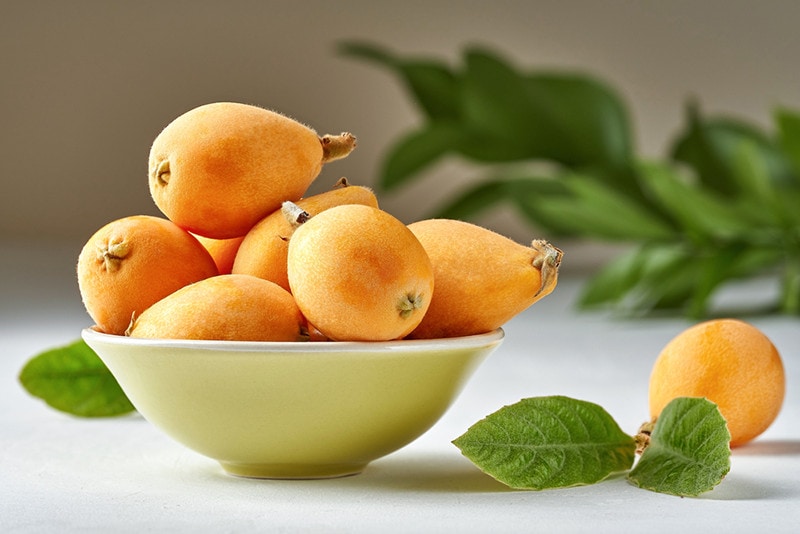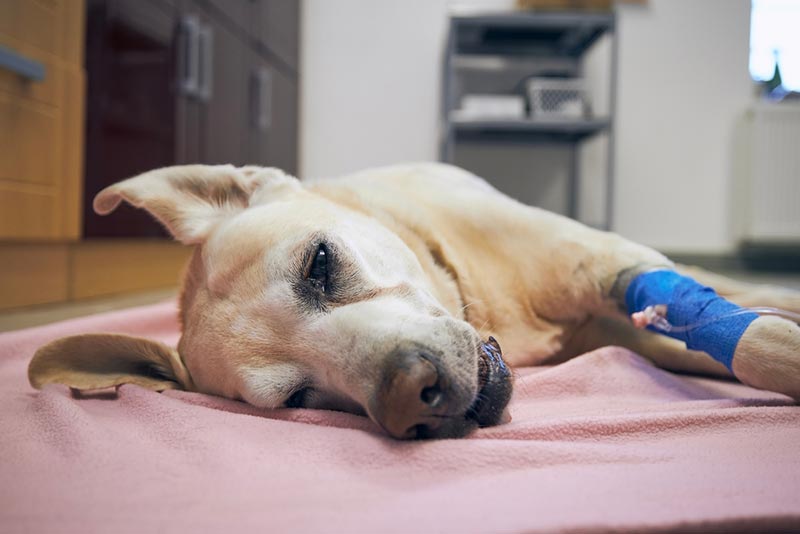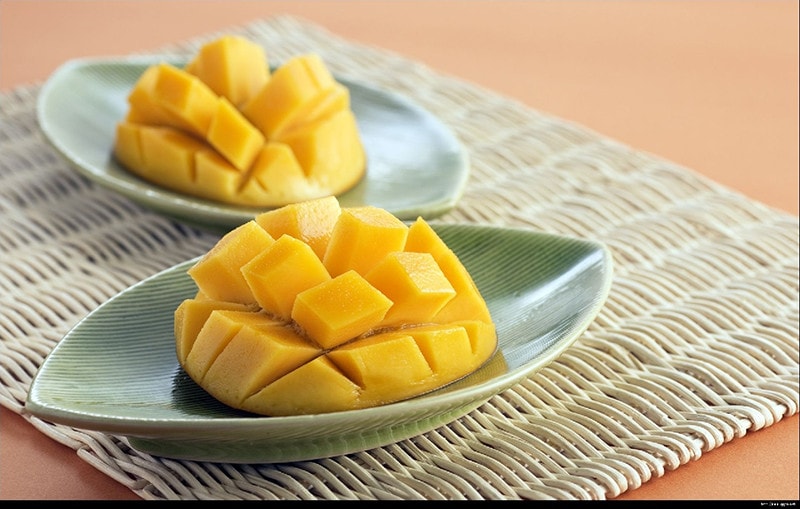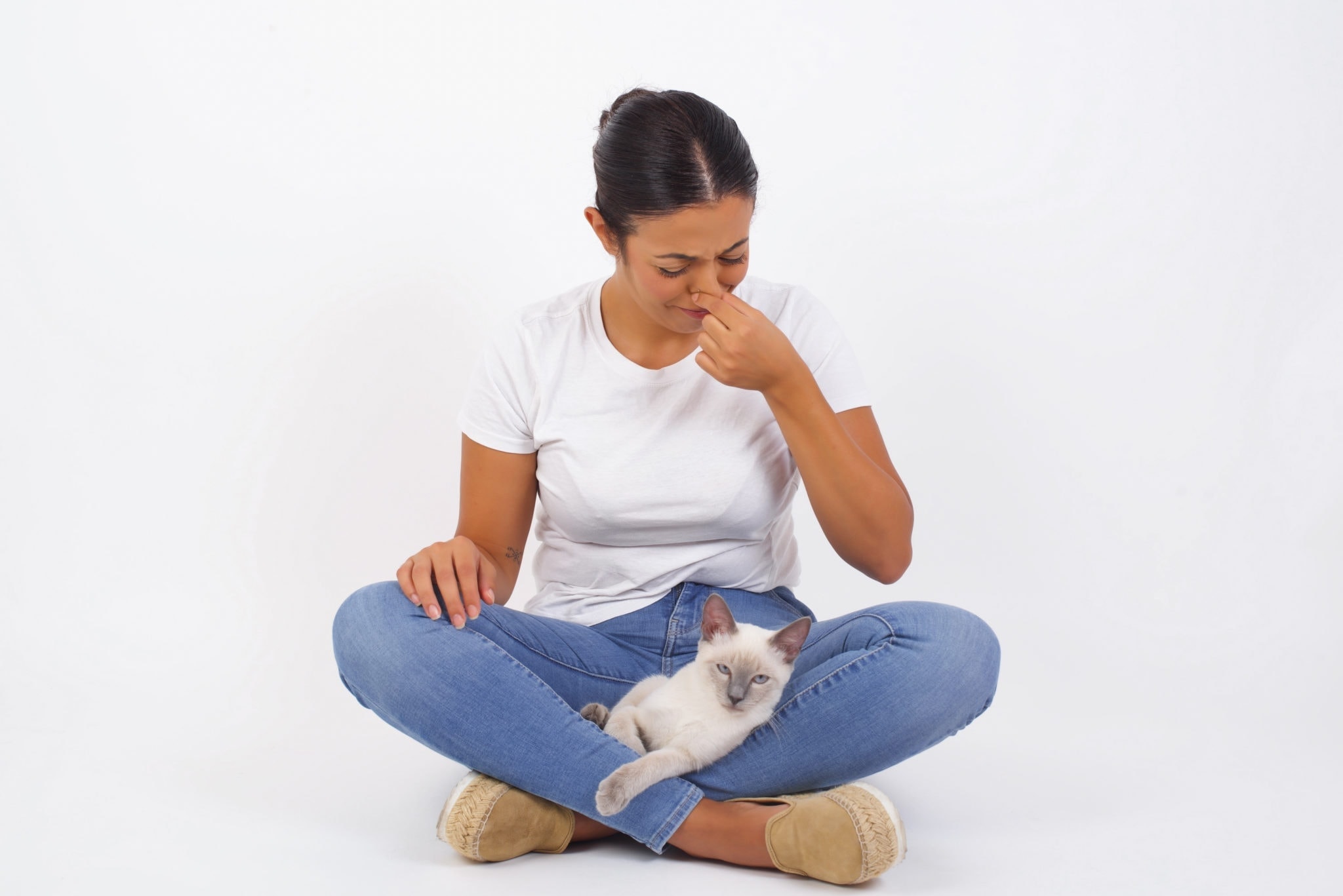Can Dogs Eat Loquats? (Vet Reviewed Facts & FAQ)
Updated on

Most dogs are essentially vacuums. If something tasty appears in their path, you can be sure that they will eat it right up! Many dog owners give fruit to their dogs as an occasional treat, but is it okay if your dog eats a loquat that they found on the ground?
The flesh of the loquat is perfectly safe for dogs, but the seed pits are toxic because they contain cyanide.
Let’s learn more about loquats and what you should watch out for if your dog eats one.
A Little About Loquats
Loquats are originally from central and southeastern China but are now cultivated in multiple continents and countries,1 including North America and Europe.
They are members of the Rosaceae family, which means they are part of the rose family. These evergreen trees bear small yellow to orange fruit ranging from 1 to 2 inches.
Loquats have a sweet yet tart flavor and have been used in traditional Chinese medicine to treat ailments such as cancer, diabetes, and coughs.

Loquat Seeds
Loquat fruit contains several large brown seeds — typically one, two, or three seeds but possibly as many as 10.
Cyanogenic Glycosides
The seeds shouldn’t be eaten because they contain cyanogenic glycosides,2 which are also present in peach and cherry pits and apple seeds.
Chewing and swallowing the loquat seeds can result in the release of cyanide in the stomach. However, you would have to eat a large number of seeds for them to cause severe poisoning.
The signs of cyanide poisoning in dogs can include the following:3
- Rapid breathing and heart rate
- Excitability
- Drooling
- Vomiting
- Diarrhea
- Watery eyes
- Voiding of urine
- Muscle spasms
- Bright red mucous membrane that turns bluish
- Convulsions
- Death
Signs of poisoning typically manifest within 15 minutes to a few hours after eating the toxic seeds. Keep in mind that this is unlikely to happen to a dog that just ate a few loquats with seeds — they would need to eat a large number of loquats.
But if your dog starts vomiting and has diarrhea after eating a loquat, contact your veterinarian immediately!

Intestinal Blockage
The seeds of the loquat are fairly large and have the potential to cause an intestinal blockage or choking.
Signs of a dog with an intestinal blockage include:
- Vomiting
- Loss of appetite
- Weakness
- Lethargy
- Abdominal pain
- Diarrhea or straining to defecate
- Weight loss
The most common sign that a dog has an intestinal blockage is vomiting and not producing feces. See your vet immediately, as this is a life-threatening situation, and your dog will likely need surgery.
Loquats and Dogs
Beyond the issues with the seeds, some dogs might have an upset stomach after eating loquat fruit. This is more likely to occur if your dog has a sensitive stomach or has never eaten loquats before.
It typically means your dog will be vomiting and have diarrhea, but there might be other signs:
- Fatigue
- Seems depressed
- Decreased or loss of appetite
- Drinking less water
- Restless and uncomfortable
- Gulping
- Licking their chops
Keep an eye on your dog, and call your vet if the signs seem to worsen or if they just don’t seem to be getting better.

Alternatives to Loquats
While the flesh of the loquat is safe for dogs and does provide a few health benefits, it’s safest to only give your dog fruits that are safe for them.
Loquats are high in antioxidants but so are blueberries and cranberries, which are often used in commercially prepared dog food.
The following are all safe fruits for your dog:
- Blueberries:These are perfect snacks because beyond washing, they don’t need any preparation and are high in fiber and antioxidants.
- Apples:Always remove the core and seeds, particularly because the seeds contain cyanide, like loquats do.
- Bananas:These are high in sugar, so while bananas are safe for dogs, they should be given in moderation.
- Cranberries:Even if your dog enjoys cranberries, go easy on how many you give them, as they are acidic and can cause diarrhea.
- Mangoes:Like the loquat, the mango pit contains cyanide, and there’s a risk of choking, so be sure to remove the pit and cut the fruit into small chunks before giving mangoes to your dog.
- Peaches:This pitted fruit contains cyanide, so make sure to remove the pit. Avoid canned peaches due to their high levels of sugar.
- Oranges:Oranges are great treats, but always remove the peel, as it can cause stomach upset.
- Cantaloupe:These are high in sugar and should only be given to dogs in moderation.
- Strawberries:These are high in sugar, so only give these to your dog as occasional treats.
- Pears:This fruit has seeds that contain cyanide, so ensure that there are no seeds when you give a piece of pear to your dog.
Most of the fruits with toxic seeds have more flesh than loquats do, which is why they are recommended.
Some vets suggest cutting away as much of the core of the fruit as possible, as the cyanide can slightly leech into the surrounding flesh.
Fruits That Should Be Avoided
Fruits that your dog should not eat include:
- Avocado:Avocados contain persin, which is toxic to dogs and will cause diarrhea and vomiting.
- Grapes:Both grapes and raisins can cause sudden kidney failure in dogs.
- Cherries:Like loquats, the cherry pit contains cyanide, and since cherries don’t have much flesh, it’s best to not feed them to your dog.
- Tomatoes:Ripe red tomatoes are fine for dogs, but the unripe and green parts of a tomato plant contain solanine, which is highly toxic to dogs.
 Conclusion
Conclusion
While the flesh of the loquat is safe for dogs, the seeds are not. If you properly prepare a loquat by peeling it and removing the seeds and core area, it might make a tasty little treat for your dog.
But since there isn’t much flesh on a loquat, your best bet is to stick to fruits that you know are safe and tasty treats for your dog.
If you want to add a new fruit or any new food to your dog’s diet, it’s best to speak to your vet first. This way, you can ensure that your dog will have a healthy and safe diet.
See also:












